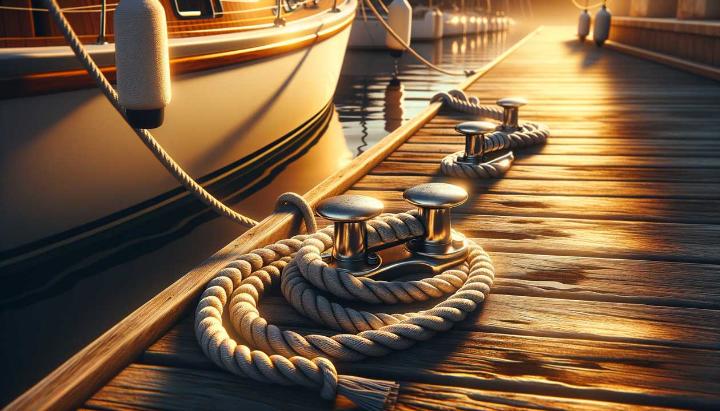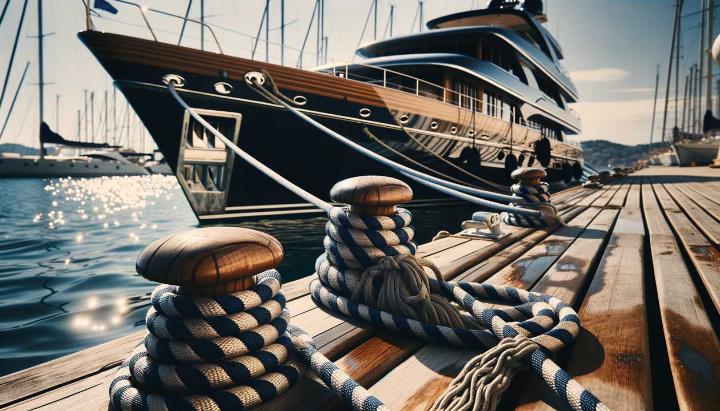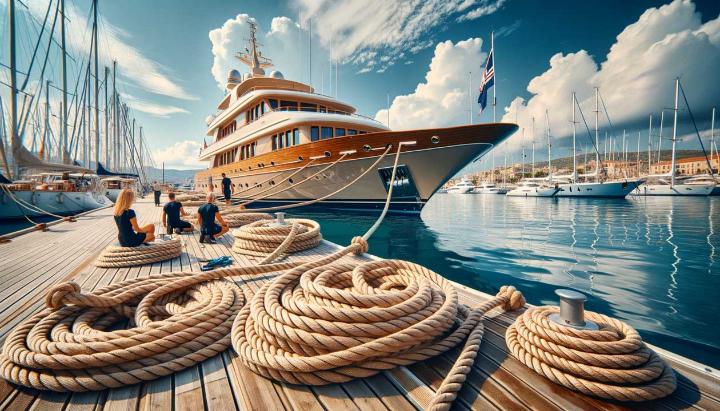Have you ever wondered why some boats glide effortlessly into their berths while others struggle against the elements? The secret lies in the unsung hero of maritime safety: the docking rope. In the world of marine engineering, the combination of PP (polypropylene) and nylon ropes has revolutionised the art of mooring. These innovative blends are not just ropes; they're the lifelines that keep vessels secure in the face of unpredictable waters.
At iRopes, we've witnessed firsthand how the right choice of rope can make or break a docking experience. Our PP rope and nylon PP rope have become the go-to solutions for savvy boat owners and harbourmasters alike. But why are these hybrid ropes causing such a stir in the maritime community?
In this post, we'll dive deep into the top applications of PP rope and nylon PP rope in docking. We'll explore how these versatile materials are transforming mooring lines, spring lines, breast lines, and stern lines. Whether you're a seasoned sailor or a curious landlubber, you'll discover why the fusion of PP and nylon is the perfect marriage for keeping vessels safe and secure. So, let's cast off and explore the world of high-performance docking ropes that are making waves in harbours around the globe.
Advantages of Using PP Rope for Docking
When it comes to securing your vessel, choosing the right rope can make all the difference. Polypropylene (PP) rope has become increasingly popular among boaters for docking applications, and for good reason. Let's dive into the unique properties that make PP rope a top choice for mariners around the world.
Unique Properties of Polypropylene Rope
As a seasoned sailor, I've had my fair share of experiences with various types of ropes. But there's something special about PP rope that keeps me coming back to it time and time again. Here's why:
- Lightweight and buoyant: PP rope floats on water, making it incredibly easy to handle and retrieve if it falls overboard. This feature alone has saved me countless headaches during docking maneuvers.
- Excellent resistance to wear and tear: The durability of PP rope is remarkable. I've seen these ropes withstand harsh marine environments for seasons without showing significant signs of degradation.
- UV resistance: Unlike some other rope materials, PP rope stands up well to prolonged sun exposure. This means you won't have to replace your docking lines as frequently, saving both time and money.
- Cost-effective solution: When compared to other rope materials, PP rope offers an excellent balance of performance and affordability. It's a smart choice for budget-conscious boaters who don't want to compromise on quality.

Comparing PP Rope to Other Docking Materials
While PP rope boasts numerous advantages, it's essential to understand how it stacks up against other common docking materials:
- PP rope vs. Nylon: Nylon is known for its elasticity and shock-absorbing properties. However, PP rope's lightweight nature and resistance to mildew make it a preferred choice for many boaters, especially in humid climates.
- PP rope vs. Polyester: Polyester ropes are stronger and less prone to stretching, but they're also heavier and more expensive. PP rope offers a good middle ground, providing adequate strength at a more accessible price point.
- PP rope vs. Natural fibers: While natural fiber ropes like manila have their place in traditional boating, PP rope outperforms them in terms of durability and resistance to rot in marine environments.
Have you ever found yourself in a situation where the properties of your docking rope made a significant difference? For me, it was during a particularly windy day at the marina. The lightweight nature of the PP rope allowed me to quickly and safely adjust my lines without struggling against the weight of a heavier rope. It's moments like these that really highlight the practical benefits of choosing the right material for your docking needs.
While PP rope is an excellent choice for many docking scenarios, it's important to consider your specific requirements. For instance, in situations where high elasticity is crucial, a nylon rope might be more suitable. Always assess your vessel's size, the local weather conditions, and your docking environment when making your final decision.
Remember, the key to safe and effective docking lies not just in the rope you choose, but also in how you use it. Proper knot tying techniques and regular maintenance of your lines are just as important as the material itself. So, whether you opt for PP rope or another type, make sure you're well-versed in proper docking procedures to keep your vessel secure in any conditions.
Benefits of Nylon PP Rope in Docking Applications
When it comes to securing your vessel, the choice of docking rope can make or break your peace of mind. Nylon PP rope, a hybrid of polypropylene and nylon, has emerged as a game-changer in the marine industry. Let's dive into why this innovative material is making waves among seasoned sailors and novice boaters alike.
Strength and Durability of Nylon Rope for Dock Lines
As someone who's weathered countless storms at the marina, I can attest to the unparalleled strength of nylon PP rope. Unlike pure polypropylene, this hybrid boasts a tensile strength that can withstand the harshest conditions Mother Nature throws your way.
- Superior tensile strength: Nylon PP rope outperforms standard PP rope by up to 20% in breaking strength, providing that extra reassurance when the winds pick up.
- Longevity in marine environments: The nylon core resists degradation from saltwater and UV rays, extending the life of your dock lines significantly.
- Maintains integrity under stress: Even after repeated use and exposure to the elements, nylon PP rope retains its structural integrity, reducing the frequency of replacements.

Shock Absorption and Flexibility Advantages
One of the most impressive features of nylon PP rope is its ability to absorb shock and flex with the movement of your vessel. This elasticity is crucial for protecting both your boat and the dock during turbulent conditions.
- Elastic properties: Nylon PP rope can stretch up to 30% of its length, acting as a buffer against sudden jerks and pulls.
- Damage prevention: The rope's flexibility reduces stress on cleats and bollards, minimising wear and tear on your vessel and dock fixtures.
- Smooth docking experience: The shock-absorbing qualities make for gentler docking manoeuvres, even in choppy waters.
I remember a particularly stormy night when my neighbour's boat, secured with standard PP rope, was constantly jerking against the dock. Meanwhile, my vessel, tethered with nylon PP rope, rode out the waves with noticeably less movement and stress on the lines. It was a stark demonstration of the material's superiority in action.
Comparing Nylon to Polypropylene and Other Rope Materials
While pure polypropylene has its merits, nylon PP rope offers a blend of benefits that sets it apart in the docking world:
- Enhanced grip: The nylon core provides better traction on cleats and bollards compared to slippery polypropylene.
- Abrasion resistance: Nylon PP rope stands up to chafing and wear better than its pure PP counterpart, crucial for high-traffic docking areas.
- UV resistance: While not as floatable as pure PP, nylon PP rope offers superior UV protection, maintaining its strength even under constant sun exposure.
- Balanced performance: It strikes a perfect balance between the lightweight nature of PP and the strength of nylon, offering the best of both worlds.
Have you ever struggled with a rope that's either too rigid or too slippery? Nylon PP rope addresses these common frustrations, providing a user-friendly experience that both novice and experienced boaters can appreciate.
In conclusion, while the initial cost of nylon PP rope might be slightly higher than pure polypropylene, its durability, performance, and safety benefits make it a wise investment for any serious boater. Remember, when it comes to securing your vessel, cutting corners on quality can lead to costly consequences down the line. Choose nylon PP rope for peace of mind and superior performance in all your docking adventures.
Specific Applications of PP and Nylon Ropes in Docking
As a seasoned mariner, I've come to appreciate the nuanced roles that different ropes play in securing a vessel. PP rope and nylon PP rope, each with their unique properties, excel in various docking applications. Let's explore how these versatile materials are put to use in the intricate dance of mooring a boat.
Mooring Lines: The Backbone of Vessel Security
Mooring lines are the unsung heroes of the docking world, keeping your vessel snug against the dock or quay. In my years of experience, I've found that both PP and nylon PP ropes have their place in this crucial role:
- PP rope for general mooring: Ideal for calm waters and short-term docking, PP rope's buoyancy makes it easy to handle and less likely to foul propellers.
- Nylon PP rope for heavy-duty mooring: When facing rougher conditions or for larger vessels, the added strength and elasticity of nylon PP rope provide that extra peace of mind.
Spring Lines: Controlling Movement Along the Dock
Spring lines are essential for preventing your boat from moving forward or backward while docked. Here's where the properties of our ropes come into play:
- PP rope for smaller boats: The lightweight nature of PP rope makes it perfect for easily adjustable spring lines on day boats or smaller pleasure craft.
- Nylon PP rope for larger vessels: The shock-absorbing qualities of nylon PP rope shine in spring line applications for larger boats, helping to cushion the effects of waves and wakes.

Breast Lines: Keeping Your Vessel Close
Breast lines are crucial for preventing your boat from drifting away from the dock. In this application, nylon PP rope truly shines:
- Superior elasticity: The nylon core allows the rope to stretch and absorb sudden jerks, protecting both your boat and the dock from damage. To understand more about the advantages of elasticity in ropes, you can read about the benefits of nylon rope stretch for high-performance use.
- Enhanced grip: The nylon PP blend provides better traction on cleats and bollards, ensuring your breast lines stay securely fastened.
Stern Lines: Precision Positioning
When it comes to controlling your vessel's position relative to the dock, PP ropes offer some distinct advantages:
- Easy handling: The lightweight nature of PP rope allows for quick adjustments, crucial when fine-tuning your boat's position.
- Visibility in low light: Many PP ropes come in bright colours, making them easier to spot and handle during early morning or late evening docking. For further details on different types of ropes and their uses, you can explore the exploring different types of braided and cotton rope.
Remember, the key to effective docking lies not just in the type of rope you choose, but in how you use it. Always consider factors like your boat's size, local weather conditions, and the duration of your stay when selecting the right rope for each docking line.
Have you ever found yourself in a situation where the right choice of rope made all the difference in a tricky docking manoeuvre? Share your experiences in the comments below – your insights could help fellow boaters make informed decisions about their docking setup!
PP rope and nylon PP rope are excellent choices for docking applications due to their unique properties. PP rope is lightweight, durable, UV-resistant, and cost-effective, making it ideal for general mooring and stern lines. Nylon PP rope, with its enhanced strength, elasticity, and shock absorption, excels in heavy-duty and high-traffic environments, perfect for mooring, spring, and breast lines. Choosing the right rope pp ensures secure and efficient docking in various conditions, leveraging their specific advantages to meet your vessel's needs.
Discover the Perfect Docking Rope for Your Needs
Please fill out the form above to learn more about how iRopes can provide the ideal PP and nylon PP rope solutions for your docking needs. Our experts are ready to offer personalised guidance and support.